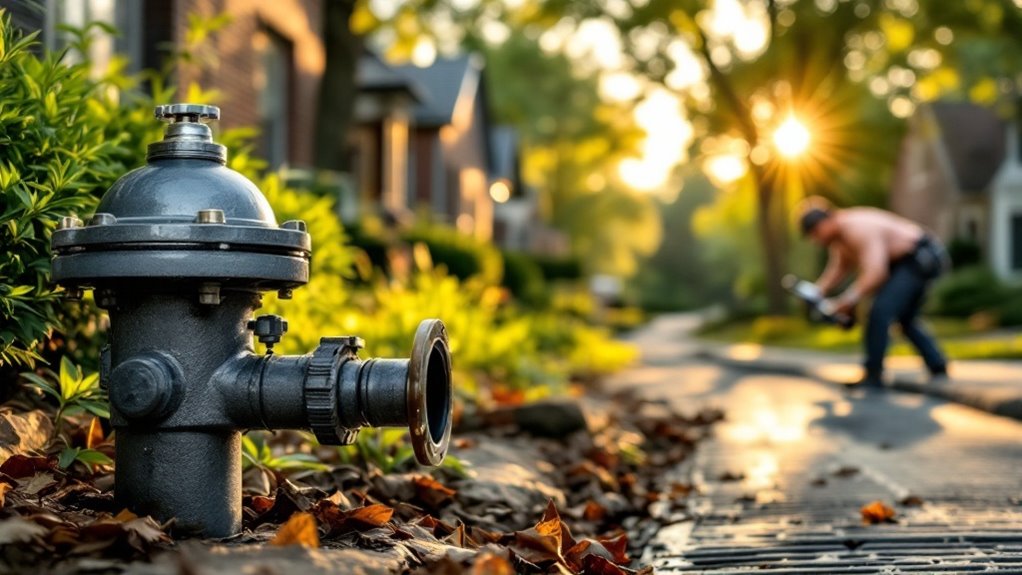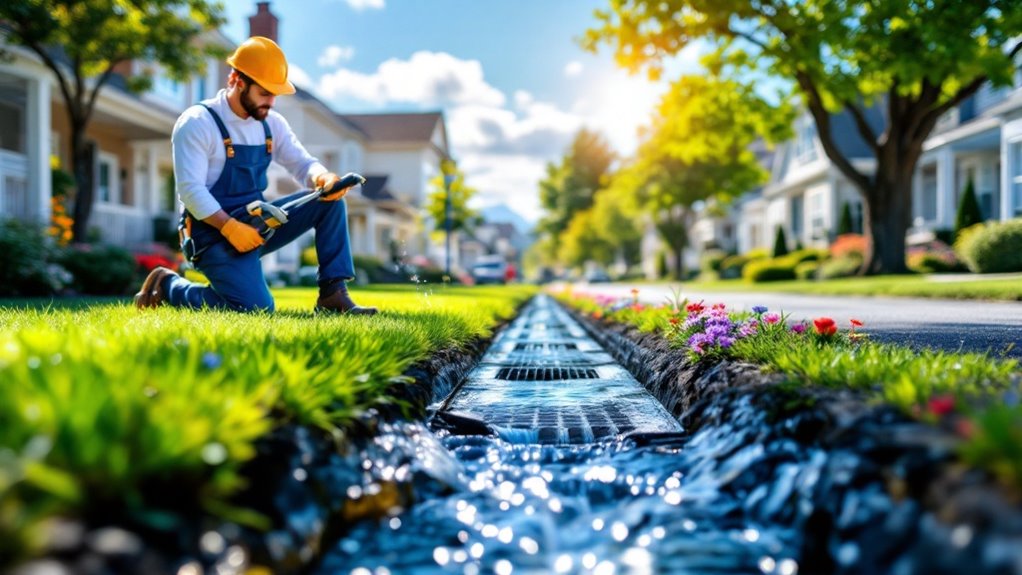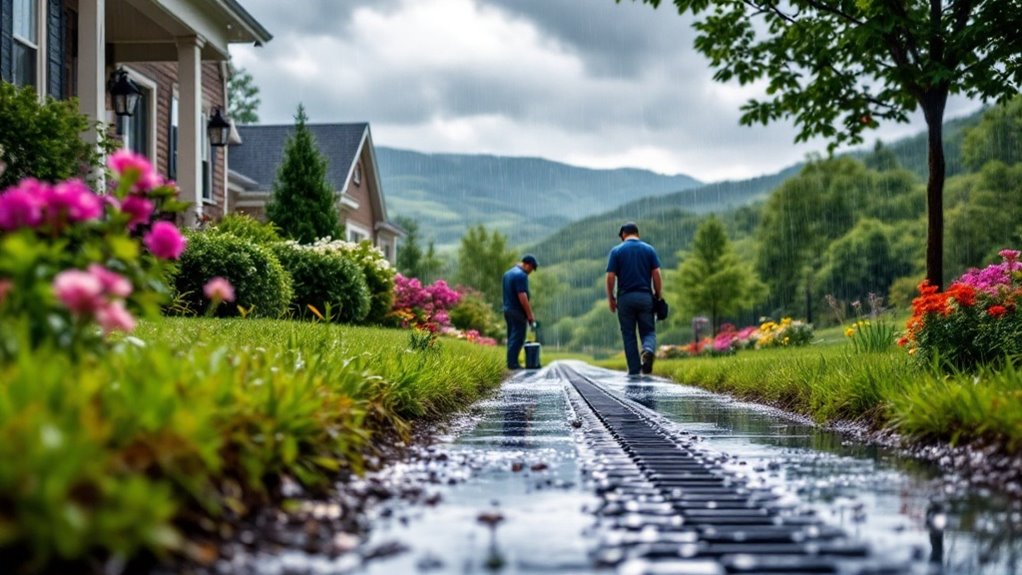To prevent plumbing emergencies in Peachtree City, regularly inspect pipes for leaks and maintain drains to avoid clogs. Implement proper drainage systems, like gutters and downspouts, to redirect water away from your foundation. Address leaks promptly to minimize damage and utilize preventative measures before heavy rainfall. Consider scheduling annual inspections with licensed professionals for expert assessments. These steps will help preserve your home's integrity and reduce repair costs. For more details, you'll find additional helpful strategies.
Key Takeaways
- Schedule regular plumbing inspections with licensed professionals to identify potential issues before they escalate into emergencies.
- Clean and maintain drains frequently to prevent clogs and ensure effective water flow.
- Inspect gutters and downspouts to direct water away from the foundation and reduce flood risks.
- Address leaks promptly by checking fixtures and pipes for moisture to prevent costly repairs.
- Implement yard grading and drainage systems to promote water flow away from your home.
Understanding Common Plumbing Issues in Peachtree City

What common plumbing issues should homeowners in Peachtree City be aware of? First, consider aging pipes that often lead to leaks, a direct consequence of the area's plumbing history. Corrosion can weaken materials, especially in older homes. Next, be mindful of tree roots invading sewer lines, which can cause blockages and backups. Clogs, particularly in kitchen sinks, are frequent as grease and food debris accumulate. Furthermore, improper installation or changes in local regulations may affect your plumbing systems, making it essential to stay informed. Regular inspections can help mitigate these risks. By understanding these issues, you can take proactive steps to maintain your plumbing and adhere to local codes, ensuring a safe, functional home. Additionally, knowing the importance of 24/7 emergency plumbing services can provide peace of mind in case of unforeseen plumbing disasters.
Regular Maintenance: The Key to Preventative Action
Regular maintenance is essential for preventing plumbing emergencies. You should inspect your pipes regularly for any signs of wear or leaks, as early detection can save you from significant damage. Furthermore, cleaning drains frequently helps prevent clogs, ensuring smooth water flow throughout your plumbing system. Additionally, emergency plumbing services can provide expert advice on maintaining your plumbing to avoid potential issues.
Inspect Pipes Regularly
Inspecting your pipes regularly is crucial for preventing costly plumbing emergencies. By conducting routine pipe inspections, you can identify potential issues before they escalate. Here are three key steps to incorporate into your plumbing assessments:
- Check for Leaks: Regularly examine your pipes for any signs of leaks, which can lead to significant damage if left unaddressed.
- Inspect Pipe Condition: Look for corrosion, rust, or cracks that may compromise pipe integrity, indicating the need for repairs or replacements.
- Evaluate Insulation: Verify that your pipes are adequately insulated, especially in colder months, to prevent freezing and bursting.
Clean Drains Frequently
After ensuring your pipes are in good condition, maintaining clean drains is another vital step in preventing plumbing emergencies. Regular drain cleaning helps you avoid clogs that can lead to costly repairs and water damage. Make it a habit to inspect your drains for any signs of buildup or debris. This proactive approach allows for timely debris removal before it becomes a significant issue.
Using a combination of hot water, vinegar, and baking soda can effectively break down grease and grime, promoting smooth flow. Furthermore, consider investing in a professional drain cleaning service annually for thorough maintenance. By prioritizing clean drains, you not only improve your plumbing system's efficiency but likewise safeguard your home from unforeseen plumbing disasters.
The Importance of Proper Drainage Systems

Proper drainage systems are crucial for effective water management in your home, preventing potential plumbing emergencies. Understanding the different types of drainage systems and implementing regular maintenance practices can greatly reduce common drainage issues. By prioritizing these elements, you can protect your property from costly damages and guarantee a functional plumbing system.
Types of Drainage Systems
Understanding the various types of drainage systems is fundamental for maintaining a functional plumbing infrastructure. Each system type plays an important role in ensuring system efficiency and preventing emergencies. Here are three primary drainage types to take into account:
- Surface Drainage: This system collects and directs water runoff from surfaces like driveways and lawns, preventing pooling.
- Subsurface Drainage: Installed below ground, this type removes excess water from soil, protecting foundations and surroundings.
- French Drains: These are trenches filled with gravel and perforated pipes, effectively redirecting water away from areas prone to flooding.
Regular Maintenance Practices
Maintaining your drainage systems is key to preventing plumbing emergencies and guaranteeing their longevity. Regular plumbing checkups help you identify potential issues before they escalate, while proactive repairs can save you from costly damage. Schedule inspections at least once a year to keep your systems in peak condition. Here's a simple maintenance checklist:
| Maintenance Task | Frequency | Importance |
|---|---|---|
| Clear gutters | Bi-annually | Prevents overflow |
| Inspect pipes | Annually | Detects leaks or blockages |
| Clean drains | Quarterly | Guarantees smooth water flow |
| Test sump pumps | Annually | Avoids flooding issues |
| Check for cracks | Semi-annually | Maintains structural integrity |
Common Drainage Issues
When drainage systems fail to function correctly, you can face a range of issues that could lead to significant property damage. Understanding these common drainage issues is vital for maintaining proper water flow and preventing emergencies. Here are three key problems to watch for:
- Clogged Drains: Debris accumulation can obstruct water flow, leading to backups and overflow.
- Improper Grading: If your terrain isn't graded correctly, water may pool around your foundation, risking structural damage.
- Damaged Pipes: Cracks or breaks in your drainage system can cause leaks, compromising your home's integrity.
Identifying and Fixing Leaks Before They Escalate
Although leaks may seem minor at first, they can quickly lead to significant damage if not addressed promptly. You should prioritize leak detection in your home to prevent costly repairs. Regularly inspect your plumbing fixtures, pipes, and appliances for signs of moisture or water stains.
When you identify a leak, consider a sealant application as a temporary fix. Nevertheless, it's vital to consult a professional for a permanent solution.
Here's a quick reference table to help you with leak identification:
| Leak Location | Signs of Leak | Recommended Action |
|---|---|---|
| Faucets | Dripping water | Tighten or replace parts |
| Pipes | Water stains | Seal with tape/sealant |
| Toilets | Constant running | Adjust flapper valve |
Stay proactive to protect your home from escalating issues.
Protecting Your Home From Heavy Rainfall

To effectively protect your home from heavy rainfall, it's crucial to implement preventive measures before a storm hits. Proper rainwater management and yard grading can greatly reduce the risk of flooding. Here are three key strategies:
- Install Gutters and Downspouts: Verify your gutters are clear and downspouts direct water away from your foundation.
- Grade Your Yard: Adjust the slope of your yard to promote water flow away from your home, preventing pooling near the foundation.
- Create a Rain Garden: Incorporate native plants that can absorb excess rainwater, enhancing drainage and adding beauty to your yard.
When to Call in the Professionals for Help
While minor plumbing issues can often be resolved with DIY fixes, knowing when to call in professionals is vital to prevent further damage and costly repairs. If you notice persistent leaks, strange odors, or water pressure changes, it's time to seek professional help. Emergency services are fundamental for situations like burst pipes or sewage backups, where immediate action is necessary. Furthermore, regular plumbing inspections can help identify potential problems before they escalate. Don't hesitate to reach out to a licensed plumber if you're unsure about a repair. Trust their expertise to guarantee your plumbing system functions properly, protecting your home from future emergencies. Remember, addressing issues early can save you time, money, and stress in the long run.
Frequently Asked Questions
What Are the Signs of a Plumbing Emergency?
You'll notice signs of a plumbing emergency if you see leaky faucets, hear dripping sounds, or find water pooling. Burst pipes can cause sudden water pressure changes, leading to significant damage if not addressed quickly.
How Can I Locate My Main Water Shut-Off Valve?
To locate your main water shut-off valve, check near your water meter, typically in basements or crawl spaces. If you're unsure, follow the pipe leading into your home; it'll guide you to the valve location.
Are There Plumbing Issues Specific to Older Homes?
Older homes often face unique plumbing issues, like pipe corrosion and outdated fixtures. You should regularly inspect your plumbing system to identify potential problems early, ensuring the integrity and efficiency of your home's water supply.
What DIY Fixes Can I Try Before Calling a Plumber?
Before calling a plumber, try tightening the faucet handle for a leaky faucet or use a plunger for a clogged drain. These simple DIY fixes often resolve common issues, saving you time and money.
How Often Should I Inspect My Plumbing System?
Your plumbing system's like a ticking time bomb; routine inspections are essential! You should inspect it at least twice a year. Keep a plumbing checklist handy to catch potential issues before they escalate into disasters.
